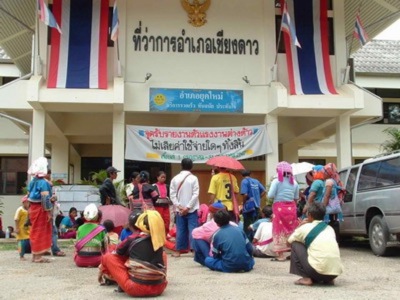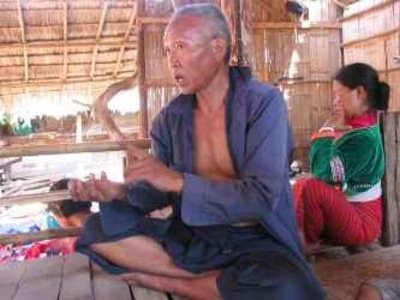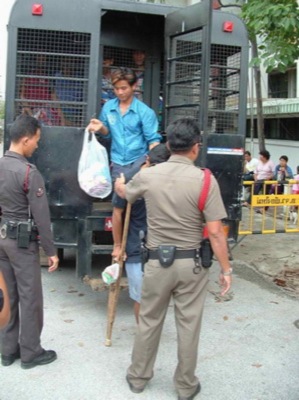By Pu Chiangdao
Photo : Ongart Decha, Anuparb Nunsong


Palaung life, forever trapped in misery
There seems no light at the end of the tunnel for the Palaung. It is like their lives have been condemned to darkness, forever trapped in misery.
March 26, 1998, Pangdaeng villagers were arrested for a second time. Forest officials and security volunteers arrested 56 villagers. They were charged with illegal migration and encroaching on a national forest reserve.
The repeated injustice against Pangdaeng villagers led to national campaign by human rights activists against the violation of the rights of ethnic minority people. Meanwhile, there was also a nationwide campaign against the prohibition on forest dwelling.
As a result, the Royal Forestry Department in 1999 accepted the principle that allow the co-existence of human and forest. Consequently, the Conservation and Rehabilitation of Chiang Dao National Forest Reserve Project (Ban Pangdaeng) in the Mae Tor river basin was established with villagers’ representatives sitting in the project’s committee.
Pratuan Kaewjaima, Pangdaeng Nok Village Head, said that the court also acquitted the 56 villagers arrested. When forest officials came to promote the community forest and food bank in the village, villagers thought that their lives would be back to normal. However, the intermittent work on the project, the lack of sincerity to involve villagers, and the lack of policy clarity of as well as the continued negative attitude of official toward the community all meant that Pangdaeng villagers’ nightmare continue.
That’s why they were arrested again on July 23, 2004, the third arrest in 15 years on the same charge of forest encroachment, much to their suffering and confusion.
“I thought the officials overreacted. If they don’t want villagers to stay here, they must clearly demarcate where the forest is, where the farm land is. Indeed villagers don’t have much farm lands, only 10 rai per each family,” village head Pratuan said.
Wiwat Tamee, of the Northern Farmers Federation secretariat and the Ethnic Network believed the repeated arrests and charges against the villagers was a ploy to pressure the villagers to move out of the area which investors would like to turn into tourist resorts. He said that the popularity of home-stay tourism had seen soaring land sales in the areas.
“The authorities always ignore the non-discrimination principle. That most villagers have no ID cards make it easier for state authorities to use any measure against the ethnic minorities based on the thinking that they are ‘others’ and not Thai people. Unless the authorities do away with such perceptions, there will always be difficulty in solving the problem.”
“I thought the officials were wrong in charging villagers with encroaching on the forest. If that is the case, why wait 20 years? Why were villagers not charged in 1984 when they first settled in the area?” said Krisman Ruanglokawiwat, another Pangdaeng villager.
His remark reminds me of those of Uncle Kham Jongtan, of Pangdaeng Nai village.
“When the villagers were arrested, my nephew who came to visit me with his parents was also arrested. He has done nothing wrong. I would like to help but there was nothing that I can do”
“You must suffer,” I tried to get him continue.
“Very much. We were arrested in 1989, then again in 1998,” Kham said in a tired voice.
“They were arrested without doing anything wrong. I heard that villagers also help in reforestation?”
“Yes, we do this every year to help conserve the forest. We live in the watershed which we must help conserve otherwise those at the end of the river will not have water for consumption. Besides, we also help preventing forest fires,”
His brother, Inprom Jongtan shared a similar experience.

“Inprom Jongtal” shared similar experience
“I don’t know what happened. Why does it have to be the villagers of Pangdaeng Nok and Pangdaeng Nai who are always been targeted, not those of other villages? I have not a single log in my house, only bamboo,”
“What we ask for is only to reside here in Thailand, we love Thailand,” Inprom whispered.
“What about the court case,” I asked.
“Not finished yet”
“I heard that someone help bail the villagers out”
“Yes, after we had been detained for 84 days, the court said if we confessed to encroaching on the forest, we will be allowed out. If not, we will be jailed. I told the court that be that as it may. It was like I was charged with stealing a chicken without any feathers found in my pocket”
“The court also told me to confess so as not to be charged for living on forest land. I refused because I have done nothing wrong. I hadn’t encroached on the forest. After that I was jailed for three more days before a team of lawyer and academicians helped bail us out,”
“If I stole the chicken, why was no feather found in my pocket…,” I repeated Inprom’s irony. He looked sad.

When will there be peaceful land?
To the Pangdaeng villagers gathered to discuss their problem, I raised the question: “If you could, what would you like to get from the authorities?”
“Justice. We want the state to care more about human life. We want officials to investigate if we really did destroy the forest; to survey how many rai we have as our farm lands; to listen to our plight, instead of accusing us of encroaching on the forest, destroying the forest. This is injustice. We have been arrested two-three times. We need help. What about the future of our children’s lives, their livelihoods?”
All this flowed from the suffering deep inside the villagers’ hearts. It reminds me of the drama by the Makham Pom group, played by the Palaung children the other day…
“Our greatest respect to all audience
Who come to listen to our plight
That day, my father was arrested, dawn it was not yet
Cocks had yet to crow, I was still undressed
Before dawn, those from the Amphoe had already taken all our fathers and men
That is the song the children and adults of Pangdaeng village composed. I share their worry about the future of these children, the Palaung of Pangdaeng. Will they ever have peace in their lives? The answer is in the wind.
Deep in their hearts, however, all Pangdaeng villagers keep up their hopes that one day, their dream of peaceful lands will come true, for many lives to suffer no more.
| The case is still in the court now. After the prosecutor filed the case, the court allowed us, five lawyers from the Law Society of Thailand to bail the villagers out. Court procedures and witness testimony will resume in 2007. In the opinion of the Law Society of Thailand, the arrest of villagers was an apparent human rights violation. It also violated provisions in the 1997 Constitution as officials had failed to produce a court warrant. When investiagted by the National Human Rights Commission, the officials involved defended their action by citing their rights under Martial Law in contrast to the army’s statement. Army officials claimed that they acted as requested by other authorities. Thus, it is clear that the arrest of Pangdaeng villagers was unlawful. Sumitchai Hattasan Law Society of Thailand The arrest of villagers failed to take into consideration basic human rights. It also showed careless enforcement of related laws. The arrest happened because the state had excluded villagers from membership of the nation-state. Villagers were not treated as people whose basic rights must be respected. Even though this case was less violent than the problem in the three southernmost provinces, it was similar in the authorities’ attitude and treatment of ethnic minorities. It showed that the authorities had failed to look at the problem comprehensively and thoroughly. Dr Chayan Vaddhaphuti |
References
Strategy in access to resources of newly settled communities within the context of forest closure, Sakunee Natpoolwat, 2001
Prachadharm News Agency, Prachatai Online Newspaper, Krungthep Thurakij newspaper, Makham Pom Drama Group
Interviews: Kham Jongtan, Inprom Jongtan, Puk Lungtee, Pangdaeng villagers, Sumitchai Hattasan of the Law Society of Thailand
Translated by Mukdawan Sakboon
Read More:
- Pangdaeng…repeated nightmare (1)
- Pangdaeng…repeated nightmare (2)
- Pangdaeng…repeated nightmare (3)
Prachatai English is an independent, non-profit news outlet committed to covering underreported issues in Thailand, especially about democratization and human rights, despite pressure from the authorities. Your support will ensure that we stay a professional media source and be able to meet the challenges and deliver in-depth reporting.
• Simple steps to support Prachatai English
1. Bank transfer to account “โครงการหนังสือพิมพ์อินเทอร์เน็ต ประชาไท” or “Prachatai Online Newspaper” 091-0-21689-4, Krungthai Bank
2. Or, Transfer money via Paypal, to e-mail address: [email protected], please leave a comment on the transaction as “For Prachatai English”
